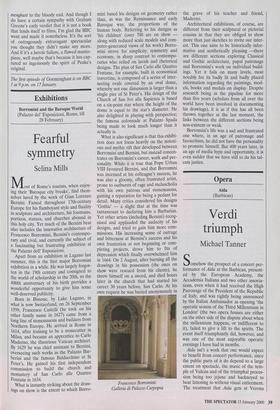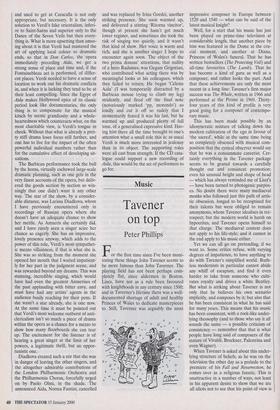Opera
Aida (Barbican)
Verdi triumph
Michael Tanner
Somehow the prospect of a concert per- formance of Aida at the Barbican, present- ed by the European Academy, the Accademia Italiana and two other associa- tions, even when it had received the High Patronage of the President of the Republic of Italy, and was rightly being announced by the Italian Ambassador as opening 'the operatic season of the Third Millennium in London' (the two opera houses are either on the other side of the dispute about when the millennium happens, or indifferent to it), failed to give a lift to the spirits. The event itself triumphantly did, however, and was one of the most enjoyable operatic evenings I have had in months.
Aida isn't a work that one would expect to benefit from concert performance, since the public parts of it do depend to a large extent on spectacle, the music of the tem- ple of Vulcan and of the triumphal proces- sion being too jejune and hackneyed to bear listening to without visual enticement. The treatment that Aida gets at Verona and used to get at Caracalla is not only appropriate, but necessary. It is the only solution to Verdi's fake orientalism, inferi- or to Saint-Saens and superior only to the Dance of the Seven Veils but then every- thing is. What is more upsetting than amus- ing about it is that Verdi had mastered the art of applying local colour to dramatic ends, so that in Don Carlos, the opera immediately preceding Aida, we get a strong sense of place and time and, if the Fontainebleau act is performed, of differ- ent places. Verdi needed to have a sense of location to work out his dramatic conflicts in, and when it is lacking they tend to be at their least compelling. Since the Egypt of Aida makes Hollywood epics of its classic period look like documentaries, the only thing is to compensate for the musical kitsch by scenic grandiosity and a whole- heartedness which counteracts what, on the most charitable view, is Verdi's tongue in cheek. Without that what is already a pret- ty stiff drama loses focus still further, and one has to live for the impact of the often powerful individual numbers rather than for the cumulative effect of developing sit- uations.
The Barbican performance took the bull by the horns, virtually eschewed large-scale dramatic planning, such as one gets in the very finest accounts of the opera, but deliv- ered the goods section by section so win- ningly that one didn't want it any other way. The star of the show, by a consider- able distance, was Larissa Diadkova, whom I have previously encountered only in recordings of Russian opera where she doesn't have an adequate chance to show her mettle. As Amneris she certainly did, and I have rarely seen a singer seize her chance so eagerly. She has an impressive, lovely presence anyway, which adds to the power of this role, Verdi's most sympathet- ic mezzo villainness, if that is what she is. She was so striking from the moment she opened her mouth that I waited impatient- ly for her part in the judgment scene, and was rewarded beyond my dreams. This was stunning, incredible singing, which would have had even the greatest Amnerises of the past applauding with bitter envy, and must have had any artists' agents in the audience busily reaching for their pens. If she wasn't a star already, she is one now. At the same time it must be pointed out that Verdi's most welcome outburst of anti- clericalism isn't so much a piece of drama within the opera as a chance for a mezzo to show how many floorboards she can tear up. The excitement for the listener is of hearing a great singer at the limit of her powers, a legitimate thrill, but an oppor- tunistic one.
Diadkova created such a stir that she was in danger of leaving the other singers, and the altogether admirable contributions of the London Philharmonic Orchestra and the Philharmonia Chorus, forcefully urged on by Paolo Olmi, in the shade. The announced Aida, Norma Fantini, cancelled and was replaced by Irina Gordei, another striking presence. She soon warmed up, and delivered a stirring aitorna vincitor', though at present she hasn't got much lower register, and sometimes she took the risk of singing too quietly, and it wasn't that kind of show. Her voice is warm and rich, and she is another singer I hope to encounter again soon. The object of the two prima donnas' attentions, that nullity of a hero Radames, was Gegam Grigorian, who contributed what acting there was by meaningful looks at his colleagues, which they failed to return. He began 'Celeste Aida' (I was temporarily distracted by a Barbican mouse trying to climb my leg) stridently, and fired off the final note (notoriously marked `pp, morendo') so loudly and cut it off so rudely that I momentarily feared it was his last, but he warmed up and produced plenty of full tone, of a generalised expressive kind. Hav- ing him there all the time brought to one's attention what a small role this is; as usual Verdi is much more interested in jealousy than in its object. The supporting roles were all cast from strength. If the CD cata- logue could support a new recording of Aida, this would be the set of performers to go for.



























































 Previous page
Previous page